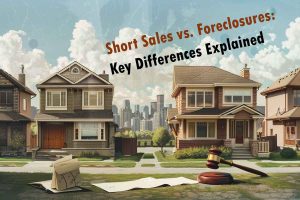Smart ways to pay off your Canadian mortgage early
Introduction: Why Pay Off Your Mortgage Early?
For many homeowners in Calgary and across Canada, the mortgage is the biggest monthly expense. Paying it off early not only eliminates that burden—it can also save you tens of thousands of dollars in interest over time.
While lower interest rates have made mortgages more manageable, rising borrowing costs in recent years are reigniting interest in early payoff strategies. But is it worth it? And how can you do it without facing hefty penalties or sacrificing liquidity?
This guide explores practical, Canadian-specific strategies to help you accelerate mortgage repayment, build equity faster, and enjoy the peace of mind that comes with being mortgage-free.
How Canadian Mortgages Are Structured
Most mortgages in Canada come with amortization periods of 25 to 30 years, but they’re broken down into shorter terms (commonly 5 years). Your interest rate is locked during each term, and once that term ends, you either renew or refinance your mortgage.
Each monthly payment consists of:
- Principal – The actual loan amount being repaid.
- Interest – The lender’s charge for borrowing money.
At the beginning of your mortgage, most of your payment goes toward interest, not principal. That’s why making extra payments early can significantly reduce your total interest paid.
📌 Example: On a $400,000 mortgage at 5.5% over 25 years, your total interest paid could exceed $330,000—nearly the cost of a second home!
The Benefits of Early Mortgage Payoff
- ✅ Save Thousands in Interest
- ✅ Build Equity Faster
- ✅ Increase Net Worth
- ✅ Free Up Future Cash Flow
- ✅ Peace of Mind—No Mortgage = Less Stress
In Canada, mortgage interest on your principal residence is not tax deductible (unlike the U.S.). That means the money you save by paying off your mortgage early is real and immediate, not offset by tax considerations.
1. Accelerated Bi-Weekly Payments: The Easiest Strategy
By switching from monthly to accelerated bi-weekly payments, you make 26 payments per year instead of 12. This effectively adds one full extra monthly payment annually.
Why It Works:
You’re reducing the principal faster, which results in less interest accumulating.
📌 Estimated Savings on a $400,000 mortgage:
- Interest Saved: ~$57,600
- Time Saved: ~3 years off the amortization
Tip: Ensure you choose accelerated bi-weekly—not regular bi-weekly.
2. Annual Lump Sum Prepayments (Up to 20%)
Most mortgage lenders in Canada (as regulated under the Bank Act) allow you to make annual lump-sum payments of up to 15%–20% of the original loan amount without penalty. These payments go directly toward principal.
📌 Example:
- $400,000 mortgage
- 20% lump sum = $80,000 (if applied gradually over years)
- Even smaller amounts, like a $5,000 lump sum early in the mortgage, can save over $10,000 in interest.
Check your mortgage contract for the exact percentage and timing rules.
3. Increase Your Regular Mortgage Payments Annually
Canadian lenders typically allow you to increase your regular payments by up to 20% per year.
📌 Boosting your monthly payment from $2,400 to $2,900 could:
- Save over $100,000 in interest
- Shave 7+ years off your mortgage
Note: Once you increase your payment, you’re often locked in for the remainder of the term, so ensure it’s affordable long-term.
4. Use Bonuses, Tax Refunds & Windfalls Strategically
Instead of spending your tax return, work bonus, or inheritance, consider using it to reduce your mortgage balance.
Lump Sum Benefits:
- Immediate principal reduction
- Compounded interest savings
- Flexible timing (within annual limits)
Tip: Always label your extra payments clearly as “Principal Prepayment” and verify with your lender that it’s applied properly.
5. Consider a Shorter Amortization at Renewal
Choosing a shorter amortization (say, 20 years instead of 25) can result in:
- Higher monthly payments, but…
- Much lower total interest paid
📌 For a $400,000 mortgage at 5.5%:
| Amortization | Monthly Payment | Total Interest |
|---|---|---|
| 25 Years | $2,442 | $332,470 |
| 20 Years | $2,738 | $257,016 |
| 15 Years | $3,255 | $185,935 |
Savings: Up to $146,535 by choosing a 15-year plan over 25 years.
Understanding Prepayment Penalties in Canada
Before making any early payment, understand prepayment penalties—especially if you’re in a fixed-rate, closed mortgage.
Your lender may charge the greater of:
- 3 months’ interest, or
- Interest Rate Differential (IRD)
IRD can be substantial if current interest rates are lower than your contracted rate. Always ask your lender for a penalty estimate before making large prepayments or breaking your mortgage early.
📌 Source: Financial Consumer Agency of Canada (FCAC)
When Is the Best Time to Prepay?
- 💰 Early in the Term – Bigger interest savings
- 💰 Before Renewal – Balance reduction before new rates apply
- 💰 Before Anniversary Date – Annual prepayment privileges often reset
- 💰 When You Receive Unexpected Income – Bonuses, gifts, tax returns
Mortgage Payoff vs. Investing: What’s Better?
This depends on your financial situation, goals, and risk tolerance.
Pay Down Mortgage If You:
- Prefer guaranteed savings (equal to mortgage rate)
- Are nearing retirement
- Don’t max out your RRSP/TFSA
- Dislike debt
Consider Investing If You:
- Have a long investment horizon
- Can consistently earn higher returns than your mortgage rate
- Are maximizing tax-advantaged accounts
📌 Tip: If your mortgage rate is above 5%, you’ll need investments yielding more than that after tax to beat the savings from mortgage prepayments.
Tax Considerations
Unlike in the U.S., mortgage interest is not tax-deductible for Canadian homeowners. So paying off your mortgage early provides true net savings.
You won’t lose any tax advantages—but you will:
- Free up money for other investments
- Reduce household stress
- Improve your net worth
Common Mistakes to Avoid
- 🚫 Making large prepayments without confirming limits
- 🚫 Paying down mortgage while carrying high-interest credit card debt
- 🚫 Ignoring RRSP/TFSA to pay off mortgage
- 🚫 Using emergency savings for mortgage prepayments
✅ Do This Instead:
- Pay off high-interest debt first
- Maintain 3–6 months of emergency funds
- Use tax-advantaged accounts
- Make strategic, penalty-free prepayments
Your Personalized Payoff Plan: Where to Start
- Read Your Mortgage Terms – Know your prepayment privileges
- Talk to Your Lender or Broker – Get exact numbers and dates
- Use a Canadian Mortgage Calculator – Test different payment scenarios
- Start Small – Begin with bi-weekly payments or one small lump sum
- Track Progress – Watch your principal drop faster than expected
- Reassess Annually – Adjust prepayment strategy as income changes
📌 Tools: Visit CMHC or Canada.ca for calculators and resources.
Final Thoughts from Malvinder S. Tiwana
Whether you’re a first-time homebuyer or a long-time homeowner, paying off your mortgage early is one of the most empowering financial moves you can make. The strategies shared above are tried-and-true methods used by Canadian homeowners to build equity faster and reduce long-term borrowing costs.
Not every approach works for every household—but every dollar counts, especially when applied early.
Want help reviewing your property investment strategy or learning more about mortgage planning in Calgary?
Visit www.maltiwana.ca for resources, property listings, and updates tailored to Alberta’s real estate market.
Disclaimer: This article is for informational purposes only. Always consult with a licensed mortgage broker or financial advisor before making decisions about your mortgage. All figures are examples and estimates based on prevailing Canadian conditions.
Written by Malvinder S. Tiwana
Tiwana Real Estate Team | Calgary, Alberta
Dedicated to smarter real estate decisions.
www.maltiwana.ca








